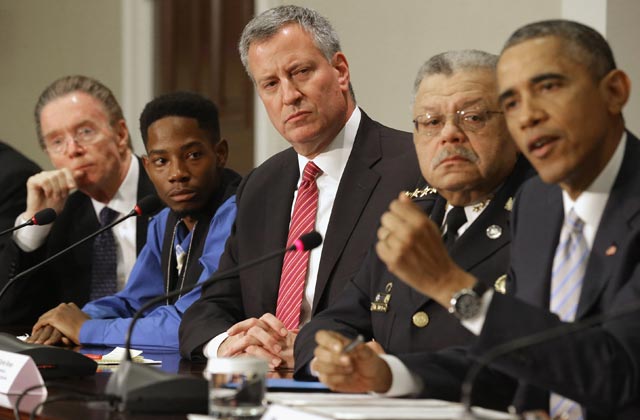After his Monday meeting with law enforcement officials, politicians and community leaders, President Obama announced a White House plan to build trust between civilians and police in light of events in Ferguson. The plan will:
1. Establish a task force on police accountability
Obama has assigned Philadelphia Police Department Chief Chuck Ramsey and George Mason University professor and former assistant attorney general Laurie Robinson as co-chairs of the task force charged with reaching out to "law enforcement and community activists and other stakeholders" to hear their ideas. In three months they will report back to the president with best practices to create police accountability, transparency and trust. They will also propose how the federal government can work with state and local communities to institutionalize these best practices.
Chief Ramsey has long led a department with a spotted record on police brutality. In an article posted on AlterNet Tuesday, Steven Rosenfeld outlines troubling tactics, including overseeing the false arrests of more than 700 people in 2000, targeting videographers and using undercover officers to provoke confrontations.
2. Demilitarize the police
The federal government’s 1033 program is responsible for getting military-grade equipment into the hands of domestic law enforcement. Following a massive show of force in Ferguson in August, President Obama ordered a review of the Pentagon’s weapons program. With that review in now, Obama is planning to sign an executive order that specifies how we are going to make sure that that program can help, how we’re going to make sure that that program is transparent, and how are we going to make sure that we’re not building a militarized culture inside our local law enforcement."
The 1033 program is pretty mismanaged as it is. As Jorge Rivas and Daniel Rivero uncovered in their investigation for Fusion, 184 local police departments have been dropped from the program, either because equipment went missing or because they violated the program rules. And we’re talking pretty serious equipment such as missing M16 assault rifles and even two Humvee vehicles. As it stands, police departments that are booted from the program can’t get new military-grade equipment–but they get to keep the equipment they’ve already recieved.
For some, the president’s overture comes a little too late.
"It’s unbelievable that we haven’t established checks and balances for the 1033 program," said Millennial Activists United’s Ashley Yates of the president’s plan. Yates was one of eight community activists who attended a meeting with the president at the White House on Monday. "We put military weapons in cities to combat terrorism, but they produce terrorism. I am terrified when I see a Humvee parked on the corner in my neighborhood."
3. Fund body cams for cops
Obama wants to invest in funding and training for police officers. This includes introducing community policing measures and 50,000 body-worn cameras. He’s going to need Congress to sign off on a $263 million spending package to make it happen–$75 million will be slated for body cams alone. The president hopes that "the training and the technology […] can enhance trust between communities and police."
Body cameras won’t necessarily put an end to police brutality–and the beatings and/or killings of Rodney King, Oscar King, John Crawford and many more have been caught on camera with little to no consequences for the officers who caused the harm. That leaves some activists doubting the outcome of this initiative.
"All across Ohio people are calling for front facing body cameras for police," said the Ohio Students Association’s James Hayes during a press call on Tuesday. "But the truth of matter is that body cameras aren’t a sure thing. Will police be able to turn them off? Will the public have access to [footage] or get justice after an incident?"
4. Convene community meetings
Attorney General Eric Holder has been tasked with participating in community conversations about police brutality in order to produce more solutions. According to the president, Holder will "begin a process in which we’re able to surface honest conversations with law enforcement, community activists, academics, elected officials [and] the faith community." Holder’s work will parallel the Ramsey and Robinson task force to tackle what Obama calls "a solvable problem" that needs sustained engagement around the country.
Some folks are already proposing more solutions.
"One tool that will allow us to have healthy conversations is the collection and dissemination of data about [police killings]," said Hayes, who would like to see data from precincts gathered the way data from schools is collected. "Much of the data that exists is incomplete–it’s either not being collected at departmental or municipal level and or it’s voluntary for them to collect it and send it to the FBI."
During his remarks on Monday, President Obama praised two of the eight activists he met with that day: Brittany Packnett and Rasheen Aldridge. According to USA Today, Aldridge–who once idolized the president–was let down by Obama. "I felt disappointed," Aldridge told the publication.
Obama’s press secretary, Josh Earnest, has said that the president is still considering whether to visit Ferguson himself, following a story published on Politico that explains how the president debated a visit to the site where Darren Wilson killed Mike Brown but decided to stay in Washington instead.
